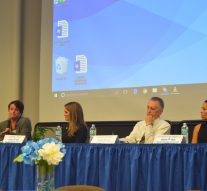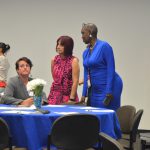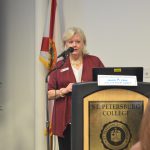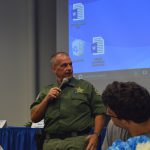
Salon Talk at Tarpon Sheds Light on Human Trafficking
SPC Programs & Events October 3, 2017By Kailey Huebl and Sarah Britton
Human trafficking, though it seems far removed from our community, is prospering in the Tampa Bay area. To combat the spread of this dark industry, more people have begun to take the first steps into researching and attending courses to be able to identify trafficking victims more easily. One of these courses was Salon Talk, held on the Tarpon Campus on September 25. This four hour course featured panelists, members from local and national law enforcement branches, and even a survivor of human trafficking.
The event began with a greeting from Pat McGhee, the founder of our local Salon Talk. After a general overview of what was to come, we met Judy Dreher, a member of the U.S.Department of Homeland Security. Dreher introduced her PowerPoint with short public service announcements regarding human trafficking before launching into an informational presentation that taught the audience how to identify and help potential victims.
While Dreher mentioned we are very focused on domestic victims, international victims are becoming a large demographic for traffickers to manipulate. Many of the victims of international trafficking are smuggled into the United States. While trafficking is not smuggling, smuggling can result in someone becoming a victim of trafficking, whether that be of forced labor or a forced sexual acts. Victims are often tricked into believing that they are not trafficked because of various reasons but debt payment, false love, and drug dependencies are huge factors.
After Ms. Dreher’s presentation, we had the opportunity to listen in on a panel presented by Tina Levene, Sasha Lohn, Brent Woody, and Natasha Nacimento. Levene spoke on behalf of her organization, the Department of Juvenile Justice and Community Outreach. By entering clubs and praying for the dancers, they have access to potential and current victims. Sasha Lohn represented the prosecution for the St. Petersburg Police Department. Lohn is responsible for putting the leaders of trafficking behind bars. Brent Woody is responsible for passing legislation for the protection of victims. Finally, Natasha Nacimento spoke about the safe girls home the community provides for underage victims. Nacimento talked about how the home transitions victims into productive and educated citizens. All of these people are responsible for helping support victims as well as end the horrific crime in our area and the nation.
After a nice lunch, the audience was greeted by Ms. Edie Rhea, a survivor of this horrible crime. Her story moved many to tears, and attendees saw how crucial paying attention was to saving victims lives. With her personal testimony, we saw the direct effect on a victim’s life. She still struggles with the horrors of her childhood. In the end, Rhea taught us about how important self-love and forgiveness are after the horrendous attack on her childhood and innocence. In addition, Rhea asked everyone to pay attention and support other victims and survivors.
If there was a remaining dry eye in the room, this was changed by Officer Alan Wilkett. His testimony of an eight year old girl who he had helped save from her own uncles, and his story of Skittles, the young woman who became addicted to substances by her early twenties, moved the entire room beyond belief. His belief that human trafficking can only stop if the entire community and country hold perpetrators accountable and support victims was beyond inspiring.
If you see someone with a fearful demeanor, majorly at large events, being spoken for, having ID withheld, or being threatened, you could have a potential trafficking victim on your hands. Rather than confront the victim, text HELP to 233733 (BEFREE) or call 1-888-373-7888. Your attentiveness and attention to detail could save a victim’s life.
Together, with the help of events like Salon Talk, we can make our community, as well as our country, safer for those who inhabit it.









